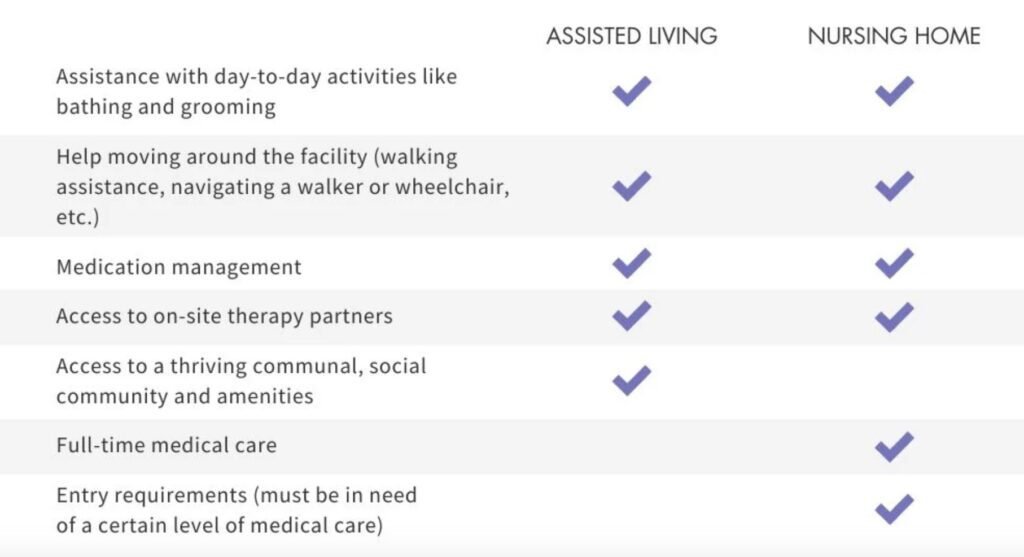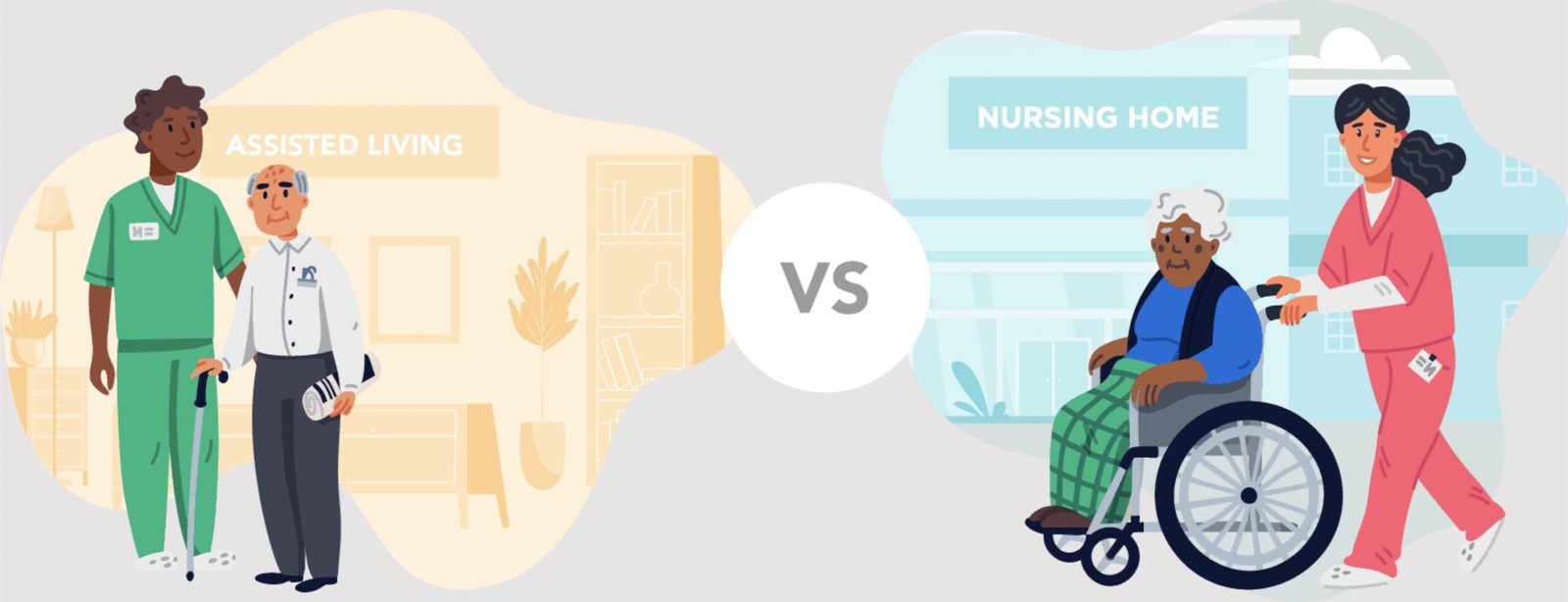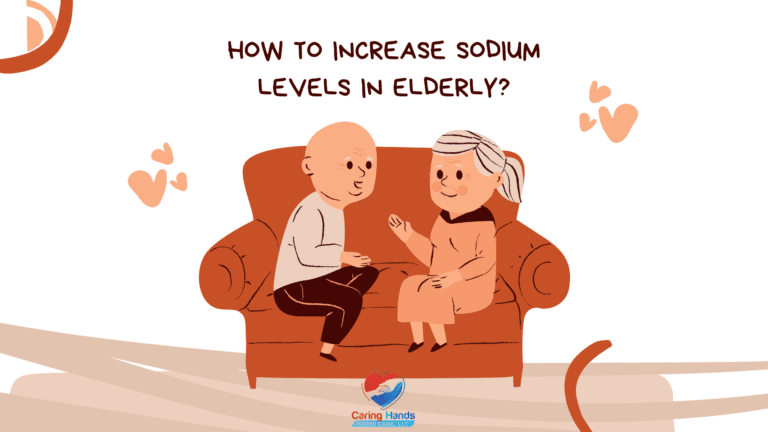☆ Assisted Living vs. Nursing Home: What Should You Choose?
The care options are more varied than ever. Families can choose any care service that suits them and their loved ones the best. Two of these care services include assisted living and nursing homes.
If your loved one requires assistance and you can’t decide which care service is the right fit for them, don’t worry because we’ve got you covered. This article will help you understand the difference between assisted living and nursing homes and the difference in services, amenities, and cost structures to help you grasp a better understanding.


How do Assisted Living and Nursing Home Differ?
Assisted living care focuses on assisting with daily life activities, meal preparation, or medication management. However, a nursing home is usually for individuals with a serious health condition or illness. These individuals require serious medical care that helps them navigate through the tough journey.
1. Services
Assisted Living
Assisted living care assists clients in a non-medical way. This care service assists with bathing, eating, grooming, or toileting. Other services may include meal preparation, laundry, and housekeeping.
Assisted living care may also provide individuals with opportunities to socially interact with the people arounExplore the key differences between assisted living and nursing homes, helping you decide the best care for loved onesd them and promote a sense of belonging. These care facilities also aim to promote independence in individuals
Nursing Home
Nursing homes approach care mainly focusing on the medical strategies to address the health conditions or illnesses of patients. Skilled nurses and trained caregivers assist individuals with specialized medical care, pain or symptom management, and rehabilitation services.


The main aim of nursing homes is to provide effective treatment to patients and improve their quality of life by addressing certain health issues. Certain therapies such as physical, occupational, and speech therapy are also offered in nursing homes.
2. Amenities
Assisted Living
Assisted living care provides amenities that aim to improve the quality of life of individuals and enhance their overall well-being. The amenities may include recreational activities, dining halls, communal settings, and transportation services.
Individuals can pursue their hobbies and engage in activities they find rewarding and fulfilling. Moreover, regular cleaning services are also provided to enhance the living environment of the individuals.
Nursing Home
For patients with an illness or a health condition, a nursing home provides amenities such as certain equipment, therapeutic activities, and safety measures. Moreover, meals are prepared considering the dietary needs of each individual.
For individuals facing mobility challenges, nursing homes provide special services to help them in their ability to move significantly. Physical therapy, recreational programs, or equipment to help them move can be provided as well.
3. Eligibility
Assisted Living
Assisted living care is preferably for people who require assistance with daily life activities. It doesn’t usually include individuals with a chronic disease.
People more likely to reach out for assisted living are elderly people as their physical and cognitive abilities become limited as they age. This type of care is also not suitable for individuals who require medical supervision and around-the-clock attention.
Nursing Home
In the case of a nursing home, care services are provided to individuals with a chronic illness or disease. Such individuals require constant medical attention and a skilled caregiver to provide them with a high standard of care and support.


People who reach out for this type of care service usually include those with complex medical needs, physical impairments, and cognitive decline. The need for a nursing home can be determined after evaluating the level of care needed considering the medical condition of the individual.
4. Environment
Assisted Living
The environment in an assisted living facility is majorly designed to make the residents feel at home. The living space can be personalized with photographs and other cherished items to promote a sense of belonging.
Moreover, with the presence of other residents and compassionate staff, a supportive environment is present in assisted living. The ambiance in assisted living is more casual and less clinical to provide individuals with a comfortable and pleasant surrounding.
Nursing Home
On the other hand, the environment in nursing care resembles that of a medical care facility. With the presence of certain equipment and nurse stations, a nursing home provides individuals with a supportive environment that caters to the needs of its patients.
The environment in a nursing home is designed to ensure the security and safety of individuals. The trained medical staff attend to the needs of the patients and ensure they receive a high standard of medical care necessary to promote their overall health.
5. Cost Structure
Assisted Living
The cost of assisted living depends on the level of care needed and the number of services availed. It is important to note that many long-term care services including assisted living are not covered by Medicare.
Nursing Home
The cost structure of a nursing home is usually expensive as the type of care provided is medical and constant supervision is offered. With a professional care team comprising healthcare professionals, the cost of nursing care is more than assisted living.
However, the cost can vary depending on the level of care needed and the services availed. The cost of nursing homes can be covered by Medicare but on a very limited basis. Short-term care services can be eligible for health insurance, however, long-term care does not.
How do Emotional and Social Aspects Differ?
In assisted living, the emotional and social aspects revolve around making the individual independent. The care team considers the individual preferences and wishes in the care process. Moreover, residents get opportunities to interact with other residents and the compassionate staff to reduce feelings of isolation and create a sense of belonging and familiarity.


In nursing homes, the social and emotional aspects are limited as the major concern is treating the health condition of the patient. The patients in nursing homes may have to encounter isolation due to aggressive medical treatments and physical and cognitive limitations. However, through group therapies or recreational group activities, efforts are constantly made in nursing homes as well to promote social interaction.
How does Autonomy Differ in Assisted Living and Nursing Home?
In assisted living, autonomy is the major focus. Individuals are involved in the care process. The care staff ensures to value the individual preferences and desires. The daily life activities are completed in such a way that the independence and dignity of the individual is maintained.
However, in the case of a nursing home, the care provided is considering the health condition of the individual. Indpendence is not quite maintained in nursing homes as it is in assisted living. Individuals have less freedom in meal selection or daily routines as it is determined by the medical healthcare plan.
How to Choose the Right Care Services?
Choosing the right care services for your loved one is an important step that should be taken after extensive consideration.
Assess Needs
Carefully assess the needs of your loved one before choosing a care service. If they have a chronic illness or disease, choose a care service that addresses the medical requirements of its patients.
Consult a Healthcare Professional
Make sure to get a healthcare professional involved. Consult doctors to determine the level of care needed to promote the overall health of an individual.
Visit Facilities
Visit the facilities to grasp a better understanding. Carefully check cleanliness, amenities, and services before making a decision.


Consider Finances
Some care services may be more expensive than others. Another key aspect before opting for a care service is to consider the finances. Also, try determining the type of care covered by insurance to make the care process more accessible.
Consider Location and Accessibility
Consider the proximity of the care facility to the family. Family visits are vital for the mental health of an individual and before choosing a care facility, it is essential to consider the ease of visitation.
Involve the Individual
Before making any decision, make sure to involve the individual. Get to know their concerns and preferences and make a decision accordingly.
Evaluate Services
Review the services provided in each type of care. Considering the individual needs, determine if the services align with their needs and requirements.
Conclusion
While assisted living and nursing homes have their own significance, the decision to choose one is more complicated than it may seem. Many factors including services, amenities, cost structure, and level of care should be considered before making a decision.
Moreover, the choice of a living facility majorly depends on the individual requirements, level of care needed, and preferences. By carefully evaluating the condition of the individual and valuing their concerns, families can choose a care facility that addresses individual needs the best and provides them with the care and support they deserve.
FAQs
Can residents continue to see their doctors while in assisted living?
Yes, residents in assisted living can continue to see their doctors.
Are nursing homes only for individuals with serious health conditions?
No, nursing homes are not limited to serious health conditions, they provide care to individuals with various health needs.
Can residents in assisted living receive medical attention if needed?
Yes, residents in assisted living can receive medical attention but the level of care provided may not be as advanced as that of nursing homes.
Can patients with dementia or Alzheimer's receive care in nursing homes?
Yes, as dementia and Alzheimer's are cognitive impairments, nursing homes have specialized programs to address the needs of such patients.
Can patients personalize their living spaces in both assisted living and nursing homes?
Yes, personalizing the living space is an option in both assisted living and nursing homes.







